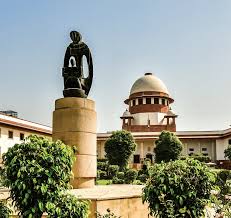(A) UP Municipal Corporation Adhiniyam, 1959, Section 172 to 174, 177, 179 to 181, Rule No.174 ‘ka’ – Uttar Pradesh Municipalities Act, 1916 , Section 128, 129A, 140 – Enemy Property Act, 1968 – Enemy Property Rules, 2015 , Rule 15 – Defence of India Rules, 1962, Rule 133-I of Defence of India (Amendment) Rules, 1962 – Defence of India Rules, 1971, Sub–rule 4 of Rule 138, Rule 151 – Transfer of Property Act, 1882, Section 54, 55(2) – Constitution of India, Article 285, 289, 296 and 300-A– Enemy Property – Custodian not owner – Whether statutory vesting of enemy property including the subject property in the Custodian amounts to expropriation and transfer of ownership so as to confer ownership of such enemy property on the Custodian? – Held that the Custodian for Enemy Property in India, in whom the enemy properties vest including the subject property, does not acquire ownership of the said properties – The enemy properties vest in the Custodian as a trustee only for the management and administration of such properties. (Para 17.9, 22.4)
(B) UP Municipal Corporation Adhiniyam, 1959, Section 172 to 174, 177, 179 to 181, Rule No.174 ‘ka’ – Uttar Pradesh Municipalities Act, 1916 , Section 128, 129A, 140 – Enemy Property Act, 1968 – Enemy Property Rules, 2015 , Rule 15 – Defence of India Rules, 1962, Rule 133-I of Defence of India (Amendment) Rules, 1962 – Defence of India Rules, 1971, Subrule 4 of Rule 138, Rule 151 – Transfer of Property Act, 1882, Section 54, 55(2) – Constitution of India, Article 285, 289, 296 and 300-A – Enemy Property – Custodian is only trustee – If the ownership of such enemy property is conferred on the Custodian for Enemy Property, whether such property becomes Union property within the meaning of Article 285 of the Constitution and therefore, it is exempt from payment of property or other local taxes to the appellant-Municipal Corporation under the provisions of the Act of 1959?–Held that the Central Government may, on a reference or complaint or on its own motion initiate a process of divestment of enemy property vested in the Custodian to the owner thereof or to such other person vide Rule 15 of the Rules – Hence, the vesting of the enemy property in the Custodian is only as a temporary measure and he acts as a trustee of the said properties. (Para 17.9, 22.4)
(C) UP Municipal Corporation Adhiniyam, 1959, Section 172 to 174, 177, 179 to 181, Rule No.174 ‘ka’ – Uttar Pradesh Municipalities Act, 1916 , Section 128, 129A, 140 – Enemy Property Act, 1968 – Enemy Property Rules, 2015 , Rule 15 – Defence of India Rules, 1962, Rule 133-I of Defence of India (Amendment) Rules, 1962 – Defence of India Rules, 1971, Subrule 4 of Rule 138, Rule 151 – Transfer of Property Act, 1882, Section 54, 55(2) – Constitution of India, Article 285, 289, 296 and 300-A – Enemy Property – Union of India not owner – Whether despite such enemy property becoming property of the Union, clause (2) of Article 285 of the Constitution enables appellant herein to impose property or other local taxes on the respondent which is lessee of the subject property? – Union of India cannot assume ownership of the enemy properties once the said property is vested in the Custodian – This is because, there is no transfer of ownership from the owner of the enemy property to the Custodian and consequently, there is no ownership rights transferred to the Union of India – Therefore, the enemy properties which vest in the Custodian are not Union properties – As the enemy properties are not Union properties, clause (1) of Article 285 does not apply to enemy properties – Clause (2) of Article 285 is an exception to clause (1) and would apply only if the enemy properties are Union properties and not otherwise – Held that the High Court was not right in holding that the respondent as occupier of the subject property, is not liable to pay any property tax or other local taxes to the appellant – Impugned order of the High Court liable to be set aside. (Para 22.4)
(D) Words and phrases – Expression ‘vest’ or ‘vesting’–Held that the expression ‘vest’ or ‘vesting’ has no precise definition and it would depend upon the context in which the expression is used under a particular enactment – Expression ‘vest’ is of fluid or flexible content and can, if the context so dictates, bear the limited sense of “being in possession and enjoyment” – The word ‘vest’ has to be understood in the different contexts in which the word occurs – The expression ‘vest’ has no fixed connotation – It is a word of variable input and therefore has to be understood in different contexts and under different circumstances – Therefore, the context and situation in which the word is used in the statute is significant in order to interpret the said expression – Under certain statutes, the word ‘vesting’ would mean placing into possession and not conferring ownership of the person who comes into possession of property – Therefore, the word ‘vesting’ is a word of variable input and has more than one meaning which must be discerned and the exact connotation must be found by looking into the scheme of law and the context in which it is used – The setting in which it is used would lend colour to it and divulge the legislative intent. (Para 16)
SUPREME COURT OF INDIA
2024 STPL(Web) 122 SC
[2024 INSC 135]
Lucknow Nagar Nigam & Others Vs. Kohli Brothers Colour Lab. Pvt. Ltd. & Others
Civil appeal no. 2878 of 2024 (Arising out of S.L.P. (Civil) No.17402 of 2017)-Decided on 22-2-2024
https://stpllaw.in/wp-content/uploads/2024/04/2024-STPLWeb-122-SC.pdf







